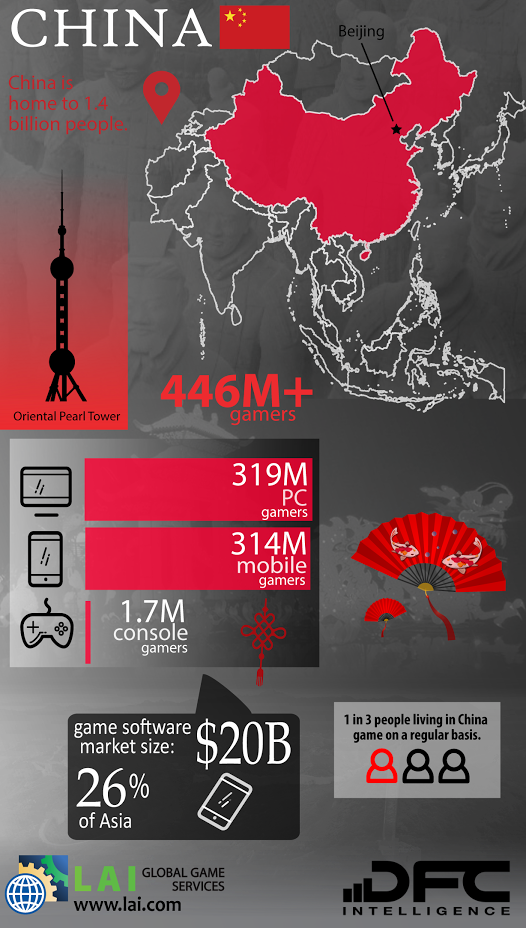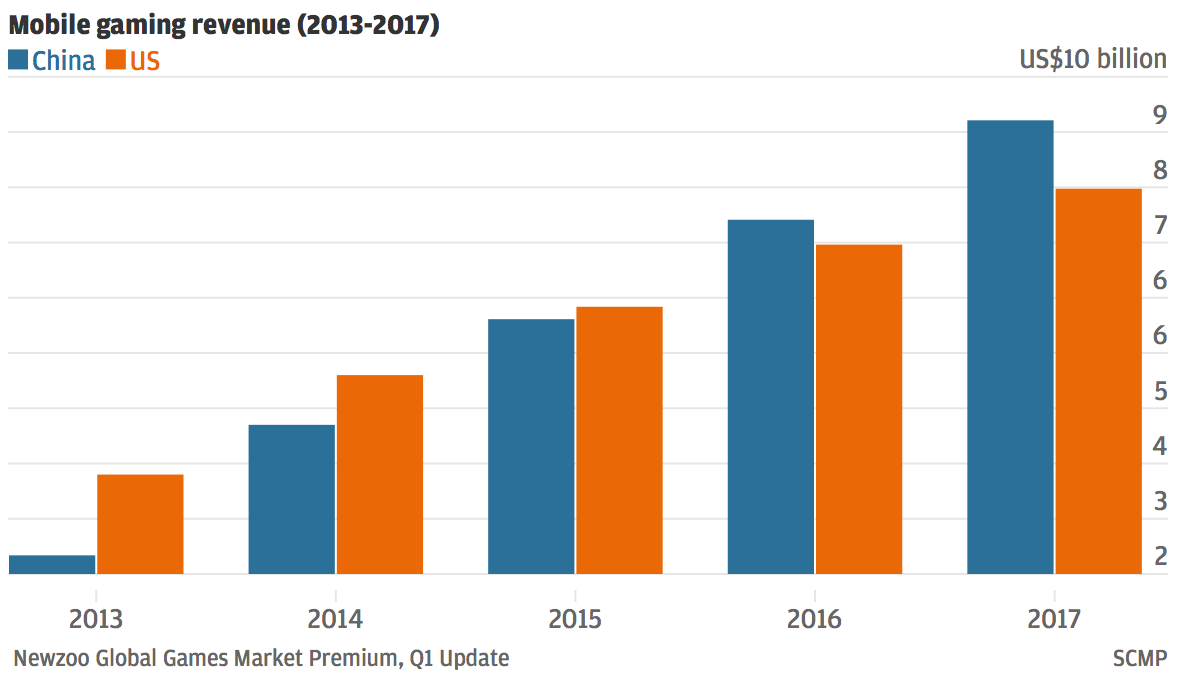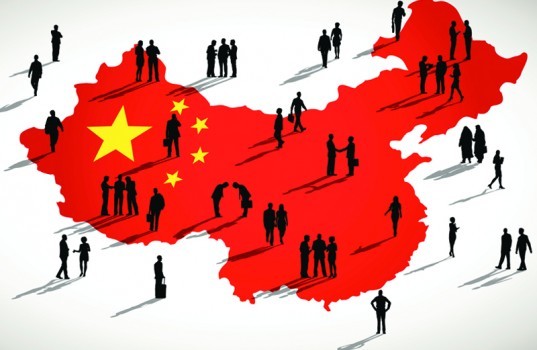The release of mobile games in China is more complicated than ever.
 On Gamasutra and other sites related to the gaming industry, there are often articles on Chinese legislation discussing bans and subsequent consoles permissions. The Chinese gaming market is difficult to understand, especially if you have no connections in China.
On Gamasutra and other sites related to the gaming industry, there are often articles on Chinese legislation discussing bans and subsequent consoles permissions. The Chinese gaming market is difficult to understand, especially if you have no connections in China.If you are a mobile developer, you might have noticed that last year the market became even more confusing.
Another requirement introduced may prevent the release of your mobile game in China , if you are not very careful.
Perspectives on the Chinese market
 The Chinese market has great potential, but most mobile game developers trying to enter it will fail.
The Chinese market has great potential, but most mobile game developers trying to enter it will fail.')
- According to GamesIndustry.biz , China today is “the most significant [mobile gaming market] in the world . ”
- The latest report by Niko Partners says that by the end of 2016, there will be 465 million mobile players in China , and the developers will earn an additional 1.3 billion dollars in the export of mobile games , and by 2020 this amount will almost double and reach 2.1 billion. dollars.
- TechCrunch recently published an article stating that China surpassed the US in revenue in the iOS App Store , and the consumption of Chinese mobile games far exceeds the US (providing 75% of the App Store revenue!).
An infographic from the TechCrunch article "China overtakes the US App Store in iOS revenue" .

Leading countries in iOS App Store.
Video Game Review in China
To understand the new requirements, it is useful to consider the evolution of video games in China. Despite the fact that the games about Mario were widespread in China in the early 1980s, only the beta version of World of Warcraft in 2005 marked the beginning of computer games. Because of the slow Internet channels, computer games have gained fame gradually.
But when they became popular, they quickly attracted the attention of the Chinese authorities, which led to the censoring or banning of many games. As soon as the products of creativity (for example, video games) become popular in China, the authorities begin to “tighten the screws” and regulate them.
Now in China, the popularity of mobile games has rapidly grown, surpassing even the popularity of games on the PC, and we are beginning to see the consequences of this.
(Below is a graph of our partner DFC Intelligence, showing an increase in the number of mobile players in China compared to players on the PC.)

Mobile games have become even more unexpected for the Chinese authorities than PC games in the past decade. They suddenly appeared and instantly spread among the masses. Because of its wide popularity, the games brought with them many problems for the government, including an increase in the number of lawsuits and problems with the intellectual property of international organizations .
As for PC games before, for mobile games, it is time for careful study, which led to modern regulation.
New Chinese Requirements
 The Chinese Regulator of Creative Media (Central State Administration for Press, Press, Broadcasting, Cinematography and Television of China, SAPPRFT) is an organization that bans individual books, films, game consoles (in previous years), limiting excessive violence in video games, and now engaged and mobile games.
The Chinese Regulator of Creative Media (Central State Administration for Press, Press, Broadcasting, Cinematography and Television of China, SAPPRFT) is an organization that bans individual books, films, game consoles (in previous years), limiting excessive violence in video games, and now engaged and mobile games.According to the new rules, any game regarded as “story-based game” must be approved by SAPPRFT. The approval process can be very long, because it has a limited number of employees.
 This is significant news , because this approval process is the biggest obstacle that faced video game developers trying to enter the Chinese market . A huge number of mobile games that flooded the market quickly attracted the attention of the Chinese leadership and led to the most serious "tightening the screws" in the entire history of video games in China.
This is significant news , because this approval process is the biggest obstacle that faced video game developers trying to enter the Chinese market . A huge number of mobile games that flooded the market quickly attracted the attention of the Chinese leadership and led to the most serious "tightening the screws" in the entire history of video games in China.The new rules came into effect in July, and since the beginning of 2016, only 22 non-Chinese mobile games have been released in China (according to the list updated by SAPPRFT on August 29).
Among the foreign games approved and released this year, the majority of large objects of foreign intellectual property: Temple Run , Candy Soda Legend , Angry Birds , Subway Surfers , Fruit Ninja and Monument Valley .
When the new rules came into force
If you come to China today and enter the App Store, you will see thousands of unapproved games. First, it was planned to withdraw all the disapproved games from the market on October 1 (but the deadline was extended until December 31 ). This means that games released in China before this year are likely to be blocked if they are not approved by the Chinese authorities.
There was a lot of talk about whether SAPPRFT has enough time and resources to block so many games on the market. However, the new rules made a splash this summer, because many believed that China would fully apply these rules.
It may take some time to block unapproved games (perhaps more than the deadline set at the end of the year), but developers should take it into account in order to avoid the risk of leaving the Chinese market.
Approval process
There are two types of approval process - accelerated for games without a storyline and long for games in which there is any semblance of a story .
Simplified approval process: games without plot
Here are briefly the requirements for a simplified approval process:

- No plot or it is very simple.
- Now the rules require that copyright owned by individuals or legal entities from China .
- This means that you definitely need to have a Chinese publisher to bring the game to the Chinese market.
- Lack of political, military, national and religious content.
The long process of approval: the game with the plot
All other games must go through a lengthy approval process, usually taking 2-4 months (in some cases, approval must wait up to 6 months!). If the developers have good connections with the government, then you can reduce the period to 40 days.
Here are the requirements for games with the plot :

- Submitting the game for approval 20 days before launch.
- Transfer of a large amount of accompanying documents.
- Sending a smartphone to the Chinese authorities with an assembly of the game, a working SIM card and a paid plan for each version of the game (for example, for Android and iPhone).
- Transfer to the Chinese authorities within one week after the release of the game additional documents and information.
What remains for indie developers to do?
Analyzing the games released in China last year, we can conclude that many publishers in China are focused on releasing games that will definitely become hits. Games that have already received great fame and earned a lot of money.
This means that it is becoming more and more difficult for mobile game developers without a popular brand to release a mobile game in the Chinese market. We do not want to say that this is impossible and that developers should not aim at China - China’s mobile market brings more income than the US market!
China has already surpassed the US in mobile gaming revenues!

Comparison of mobile gaming revenues in China and the United States (in billions of dollars)
It simply means that foreign developers seeking to release mobile games in China must find a recognized local partner interested in publishing their games.
Now mobile developers already need to cooperate with local partners , because foreign legal entities no longer have the right to publish in China. Large Chinese publishers usually support only popular brands (such as Candy Crush ), so finding a partner who is ready to publish your game may be delayed. But such partners, and at the same time reliable, exist.
Important warning
Doing business in China for a foreigner can be difficult. Frequent fraud and getting the wrong information from people who verbally seek to help you.
We want to warn you:
- Be wary of scammers - there are many fraudulent “publishers” and “agents” who only want to get money from you.
- Some people may convince you that they are “authorized agents” who can help with the approval process of the game. But this is not true! Such scammers are a well-known problem of foreign developers seeking to enter the Chinese market. The Chinese authorities have already issued an official statement that no "authorized agents" exist .
- Some developers claim that this whole process is just a cover for corruption, forcing developers to share revenue with already large local developers. As in any other business, do not enter into transactions that do not suit you !
Why is partner the key to success in China?

China is a country in which personal relations ( guanxi ) are extremely important . It is very likely that without going through the “communication channels”, your game, on the development (and maybe localization) of which you spent a lot of time and effort for China, will not be released in China.

Source: https://habr.com/ru/post/314720/
All Articles